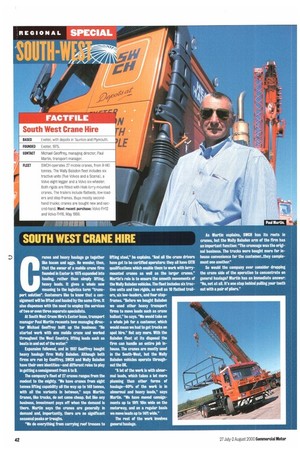SOUTH WEST CRANE HIRE
Page 44

If you've noticed an error in this article please click here to report it so we can fix it.
cpranes and heavy haulage go together like bacon and eggs. No wonder, then, that the owner of a mobile crane firm founded in Exeter in 1975 expanded into hauling, rather than simply lifting, heavy loads. It gives a whole new meaning to the logistics term "transport solution". Customers like to know that a consignment will be lifted and hauled by the same firm. It also dispenses with the need to employ the services of two or even three separate specialists.
At South West Crane Hire's Exeter base, transport manager Paul Martin recounts how managing director Michael Geoffrey built up the business: "He started work with one mobile crane and worked throughout the West Country, lifting loads such as beats in and out of the water" Expansion followed, and in 1997 Geoffrey bought heavy haulage firm Wally Balsdon. Although both firms are run by Geoffrey, SWCH and Wally Balsdon have their own identities—and different roles to play in getting a consignment from A to B.
The company's fleet of 27 cranes ranges from the modest to the mighty. "We have cranes from eight tonnes lifting capability all the way up to 140 tonnes, with all the variants in between,' says Martin. Cranes, like trucks, do not come cheap. But like any business, investment pays off when the demand is there. Martin says the cranes are generally in demand and, importantly, there are no significant seasonal peaks or troughs.
"We do everything from carrying reef tresses to lifting steel," he explains. "And all the crane drivers have got to be certified operators: they all have MB qualifications which enable them to work with lorry mounted cranes as well as the larger cranes." Martin's role is to ensure the smooth movements of the Wally Balsdon vehicles. The fleet includes six tractive units and two rigids, as well as 10 flatbed trailers, six low-loaders, and four stepframes. "Before we bought Balsdon we used other heavy transport firms to move loads such as crane ballast," he says. "We would take on a whole job for a customer, which would mean we had to get trucks on spot hire." Not any more. With the Baisdon fleet at its disposal the firm can handle an entire job inhouse. the cranes are mostly used in the South-West, but the Wally Balsdon vehicles operate throughout the Ut "A lot of the work is with abnormal loads, which takes a lot more planning than other forms of haulage-60% of the work is in abnormal and heavy loads," says Martin. "We have moved consignments up to 19ft 10in wide on the motorway, and on a regular basis we move loads up to 14ft wide."
The rest of the work involves general haulage. As Martin explains, SWCH has its roots in cranes, but the Wally Balsdon arm of the firm has an important function: "The craneage was the original business. The trucks were bought more for inhouse convenience for the customer...they complement one another" So would the company ever consider dropping the crane side of the operation to concentrate on general haulage? Martin has an immediate answer: "No, not at all. It's one step behind pulling your teeth out with a pair of pliers."












































































































